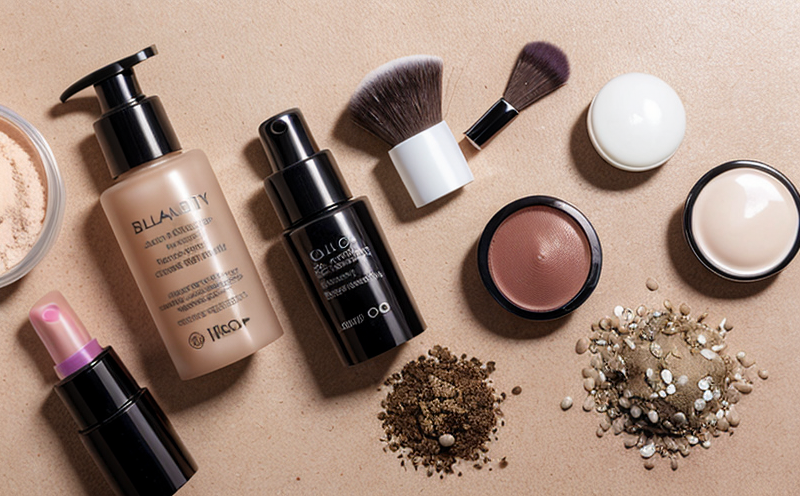Biodegradability Testing of Cosmetic Oils and Waxes
The biodegradability testing of cosmetic oils and waxes is a critical aspect of the cosmetics industry, ensuring that products not only meet regulatory standards but also align with consumer expectations for sustainability. This test evaluates how quickly and effectively these ingredients can decompose in natural environments, which impacts their environmental footprint.
Cosmetic oils and waxes are often derived from various sources including petroleum, plant-based, or animal-derived materials. Each type presents unique challenges when it comes to assessing biodegradability. Petroleum derivatives may take longer to break down due to their complex molecular structures, while plant- and animal-based products typically degrade more readily under suitable conditions.
Biodegradability testing is conducted in accordance with international standards such as ISO 14684 and ASTM D5327. These protocols provide detailed methodologies for determining the extent of degradation through various means including chemical analysis, microbial activity assessment, and visual observation over time.
The process involves preparing samples of the cosmetic oil or wax according to specified guidelines laid out in these standards. Specimens are then incubated under controlled conditions designed to simulate real-world scenarios where they might be exposed—such as soil or water environments. During this period, scientists monitor changes in physical properties like color change, viscosity alteration, and observable signs of microbial colonization.
Once testing concludes, results are interpreted based on set criteria which may include percentage weight loss, optical density measurements, or other indicators depending upon the chosen method. From these data points, conclusions about the biodegradability can be drawn and used to inform decisions regarding formulation adjustments aimed at reducing environmental impact without compromising product performance.
Understanding how different components behave under such tests helps brands develop more eco-friendly formulations that comply with growing demands for green practices within the beauty industry. By incorporating this knowledge into R&D efforts, companies can stay ahead of regulatory trends while fostering positive brand perceptions among environmentally conscious consumers.
Why It Matters
The importance of biodegradability testing cannot be overstated in today's increasingly environmentally aware market. Regulatory bodies worldwide are imposing stricter regulations on manufacturers to ensure their products have minimal adverse effects on ecosystems after disposal.
- Regulatory Compliance: Meeting specific criteria outlined by organizations like the EU Cosmetics Regulation ensures that your product remains compliant with international standards.
- Sustainable Brand Image: Demonstrating responsible stewardship through sustainable practices enhances customer loyalty and trust.
- Consumer Demand: As more consumers prioritize ethical purchasing choices, offering biodegradable options becomes essential for maintaining market share.
By investing in rigorous biodegradability testing early on in product development stages, companies not only avoid potential penalties associated with non-compliance but also position themselves favorably among eco-conscious consumers. This proactive approach fosters long-term relationships built on mutual respect and shared values regarding sustainability.
Industry Applications
| Application | Description |
|---|---|
| Sustainable Formulations | Evaluating the environmental impact of cosmetic oils and waxes helps formulate products that are less harmful to nature. |
| Compliance with Regulations | Avoiding legal issues by ensuring all ingredients meet stringent biodegradability requirements imposed by regulatory bodies. |
| Enhanced Brand Reputation | Building a reputation as an environmentally responsible company attracts customers who value sustainability above price. |
- Skin Care Products: Ensuring that emulsifiers and preservatives used in lotions and creams do not persist indefinitely after application.
- Hair Care Products: Assessing whether conditioners or shampoos leave behind residues that could contribute to pollution when washed down drains.
- Makeup Items: Checking lipstick formulas for any components that might take too long to decompose, thus avoiding contamination of soil or water sources.
These applications highlight just a few ways in which biodegradability testing plays a vital role across diverse segments within the cosmetics sector. Accurate and reliable results from this type of analysis enable manufacturers to make informed decisions that positively influence both business operations and environmental health.
Quality and Reliability Assurance
The reliability and accuracy of biodegradability testing are paramount in ensuring consistent quality across all batches produced by cosmetic manufacturers. To maintain these standards, laboratories employ experienced professionals equipped with state-of-the-art equipment capable of delivering precise measurements.
A well-established procedure includes:
- Sample preparation following strict protocols defined by relevant standards.
- Incubation periods tailored to mimic realistic conditions under which the products will be exposed.
- Ongoing monitoring and documentation throughout each stage of testing.
The use of advanced analytical techniques such as gas chromatography-mass spectrometry (GC-MS) allows for detailed breakdowns of chemical compounds present in samples. Additionally, automated systems help streamline repetitive tasks while minimizing human error.
Accreditation by recognized bodies like ISO/IEC 17025 guarantees that the laboratory adheres to high-quality practices throughout its operations. Regular audits further ensure continuous improvement and adherence to best industry standards.
By leveraging these robust procedures, cosmetic companies can rest assured knowing their products undergo thorough evaluation before reaching consumers. This commitment to excellence not only enhances product safety but also strengthens brand integrity in the competitive global marketplace.





